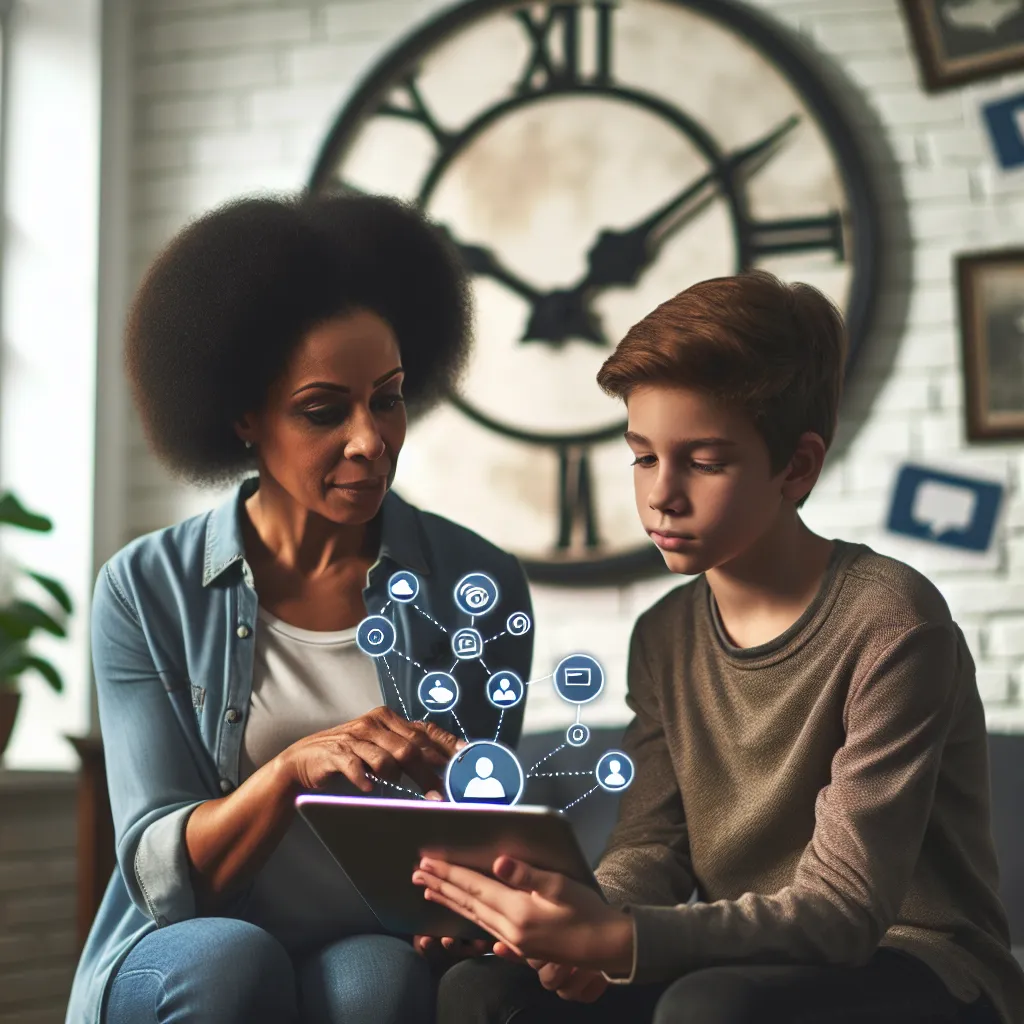In recent years, the IELTS Speaking exam has increasingly featured questions about technology and its impact on our daily lives. One common topic that often appears is describing experiences with new apps or technologies. This article will guide you through how to effectively answer such questions and provide sample responses to help you achieve a high band score.
Nội dung bài viết
- Understanding the Topic
- Part 1: Introduction and Interview
- Q: Do you often use apps on your smartphone?
- Q: What kind of new technology have you used recently?
- Part 2: Long Turn (Cue Card)
- Sample Answer (Band 8-9):
- Follow-up Questions:
- Part 3: Two-way Discussion
- Q: How do you think technology has changed the way we learn new skills?
- Q: Do you think there are any downsides to relying too much on technology for learning?
- Key Vocabulary and Phrases
- Examiner’s Advice
Understanding the Topic
The topic “Describe a time when you used a new app or technology” is a popular choice for IELTS examiners as it allows candidates to demonstrate their ability to discuss personal experiences, express opinions, and use vocabulary related to modern technology. This topic is likely to remain relevant in future IELTS exams due to the rapid advancements in technology and its growing influence on our lives.
 IELTS Speaking Exam
IELTS Speaking Exam
Part 1: Introduction and Interview
In Part 1 of the IELTS Speaking test, you may encounter questions related to technology and apps. Here are some common questions and sample answers:
Q: Do you often use apps on your smartphone?
Band 6-7 Answer: Yes, I use apps quite frequently on my phone. I have several apps that I use daily, like social media and messaging apps.
Band 8-9 Answer: Absolutely! I’m quite reliant on various apps in my day-to-day life. From productivity tools to social networking platforms, I find myself constantly engaging with a diverse range of applications on my smartphone.
Q: What kind of new technology have you used recently?
Band 6-7 Answer: Recently, I started using a smartwatch. It’s been helpful for tracking my fitness and receiving notifications.
Band 8-9 Answer: I’ve recently delved into the world of virtual reality through a VR headset. It’s been an eye-opening experience, allowing me to explore immersive environments and even participate in virtual meetings, which I find fascinating from both a technological and social perspective.
Part 2: Long Turn (Cue Card)
Here’s a sample cue card related to the topic:
Describe a time when you used a new app or technology
You should say:
- What the app or technology was
- When and where you used it
- Why you decided to use it
- And explain how you felt about using this new app or technology
Sample Answer (Band 8-9):
I’d like to talk about my experience with a language learning app called Duolingo, which I started using about six months ago.
The app is a popular platform for learning various languages, and I decided to give it a try when I set a goal to improve my Spanish skills. I initially downloaded it on my smartphone, which allowed me to practice Spanish during my daily commute on the train and in my free time at home.
The primary reason I chose to use Duolingo was its gamified approach to language learning. I had heard from friends that it made the learning process more engaging and fun, which appealed to me as I often struggled to maintain motivation with traditional learning methods.
From the moment I started using the app, I was genuinely impressed by its user-friendly interface and interactive lessons. The bite-sized lessons and immediate feedback made it easy to track my progress, which I found incredibly motivating. What struck me most was how the app cleverly used spaced repetition techniques to reinforce vocabulary and grammar concepts, making the learning process more efficient.
One aspect that I particularly appreciated was the app’s ability to adapt to my learning pace. If I struggled with certain concepts, it would provide additional practice, ensuring I had a solid grasp before moving on to more advanced topics.
Overall, my experience with Duolingo has been overwhelmingly positive. It has not only helped me make significant progress in Spanish but has also rekindled my enthusiasm for language learning in general. The combination of technology and education in this app has truly transformed my approach to acquiring new skills, making the process both enjoyable and effective.
Follow-up Questions:
- How has this app changed your approach to learning languages?
- Do you think such apps can replace traditional language classes?
Band 8-9 Answer:
-
This app has revolutionized my approach to language learning by making it a daily habit rather than an occasional activity. The gamification elements have transformed what could be a tedious process into an engaging and rewarding experience. Moreover, the app’s data-driven approach has made me more aware of my strengths and weaknesses, allowing me to focus my efforts more efficiently.
-
While I believe these apps are incredibly valuable tools, I don’t think they can entirely replace traditional language classes. The human interaction and cultural immersion provided by a skilled teacher are irreplaceable aspects of language learning. However, I see these apps as powerful supplements that can significantly enhance the learning process when used in conjunction with traditional methods.
Part 3: Two-way Discussion
In Part 3, the examiner might ask more abstract questions related to technology and education. Here are some examples:
Q: How do you think technology has changed the way we learn new skills?
Band 6-7 Answer: Technology has made learning more accessible. We can now learn anything online through videos and apps, which wasn’t possible before.
Band 8-9 Answer: Technology has fundamentally transformed the landscape of skill acquisition in numerous ways. Firstly, it has democratized access to information, allowing anyone with an internet connection to learn from experts worldwide. Moreover, adaptive learning technologies have personalized the educational experience, catering to individual learning styles and paces. The integration of virtual and augmented reality has also revolutionized hands-on learning in fields like medicine and engineering, providing safe environments for practice. However, this technological shift also presents challenges, such as information overload and the need for digital literacy skills to navigate the vast sea of online resources effectively.
Q: Do you think there are any downsides to relying too much on technology for learning?
Band 6-7 Answer: Yes, I think there can be downsides. People might become too dependent on technology and lose some important skills, like remembering information or solving problems on their own.
Band 8-9 Answer: While technology undoubtedly offers numerous benefits for learning, over-reliance can indeed have several drawbacks. One significant concern is the potential erosion of critical thinking skills. When information is readily available at our fingertips, there’s a risk of developing a superficial understanding rather than engaging in deep, analytical thinking. Additionally, excessive screen time associated with digital learning can lead to issues such as digital eye strain and reduced attention spans.
Another crucial aspect to consider is the potential loss of important interpersonal skills. Face-to-face interactions and collaborative learning experiences, which are vital for developing communication and teamwork abilities, might be diminished in a heavily technology-dependent learning environment.
Furthermore, the digital divide can exacerbate educational inequalities, as not everyone has equal access to the latest technologies or high-speed internet. It’s imperative to strike a balance, leveraging technology as a powerful tool while still maintaining traditional learning methods that foster creativity, critical thinking, and social skills.
Key Vocabulary and Phrases
To achieve a high band score, incorporate these advanced vocabulary items and phrases into your responses:
-
Gamification (noun) – /ˌɡeɪmɪfɪˈkeɪʃ(ə)n/ – The application of typical elements of game playing to other areas of activity.
Example: “The gamification of the language learning process made it more engaging.” -
User-friendly interface (noun phrase) – An interface designed to be easy to use and understand.
Example: “The app’s user-friendly interface made navigation intuitive.” -
Spaced repetition (noun phrase) – A learning technique that involves reviewing information at gradually increasing intervals.
Example: “The app utilized spaced repetition to enhance long-term retention of vocabulary.” -
Adaptive learning (noun phrase) – An educational method which uses computer algorithms to orchestrate the interaction with the learner.
Example: “The adaptive learning technology personalized my learning experience.” -
Digital literacy (noun phrase) – /ˈdɪdʒɪt(ə)l ˈlɪt(ə)rəsi/ – The ability to use information and communication technologies to find, evaluate, create, and communicate information.
Example: “Developing digital literacy is crucial in today’s technology-driven world.”
Examiner’s Advice
To excel in the IELTS Speaking test, particularly when discussing technology:
- Practice describing your experiences with technology in detail, focusing on your feelings and the impact it had on you.
- Develop a range of vocabulary related to technology and its effects on society.
- Be prepared to discuss both the advantages and disadvantages of technological advancements.
- Use specific examples to support your opinions and ideas.
- Practice speaking about technology in a fluent and coherent manner, using appropriate linking words and phrases.
Remember, the key to a high band score is not just about what you say, but how you say it. Aim for clear pronunciation, natural intonation, and a good range of grammatical structures.
For more tips on improving your IELTS Speaking skills, check out our article on how to describe a recent advancement in technology that impacted your work or study.


